Photostat copy of diaries of Benjamin Bennett Leane, 1915 - Part 8
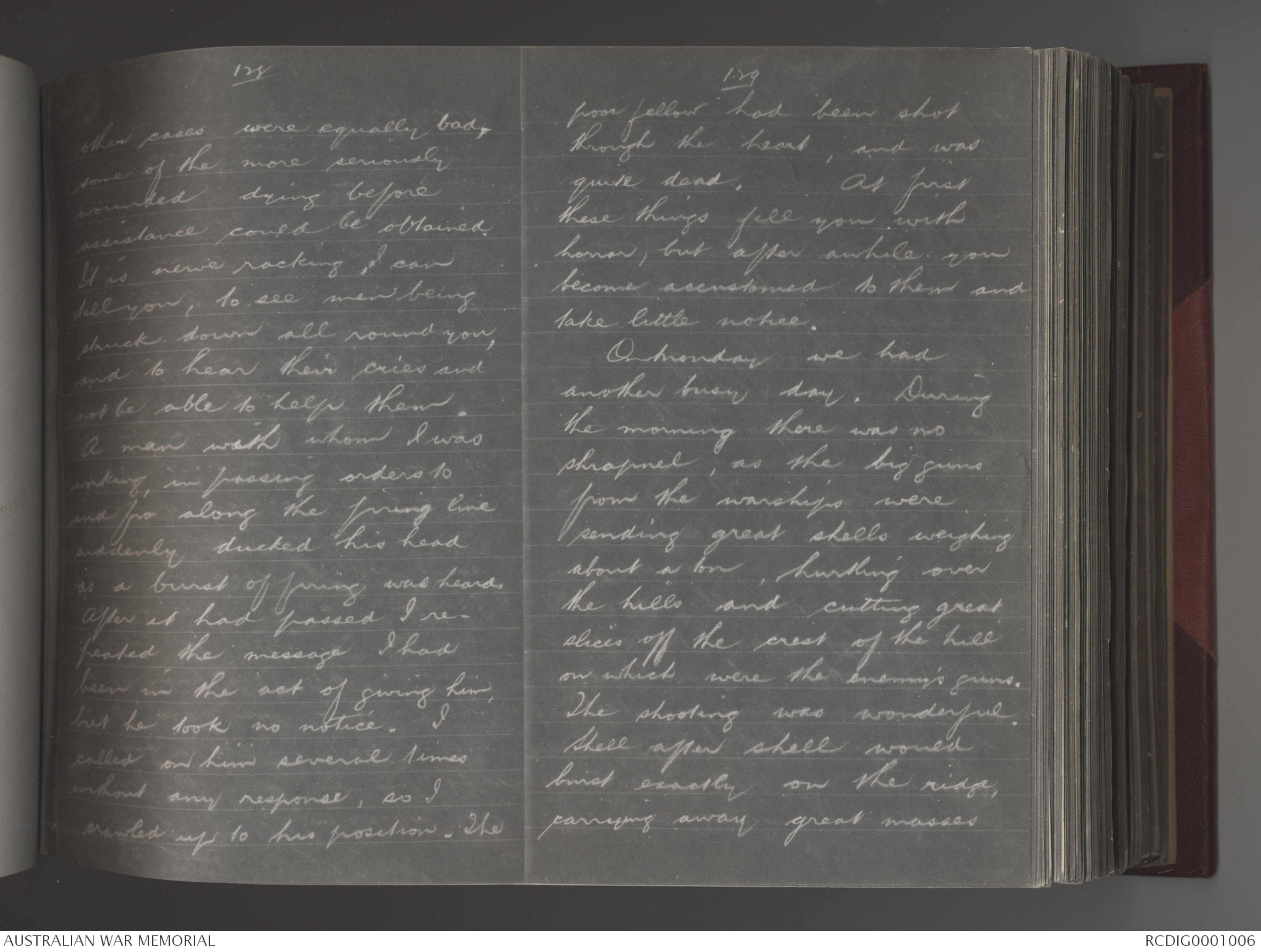
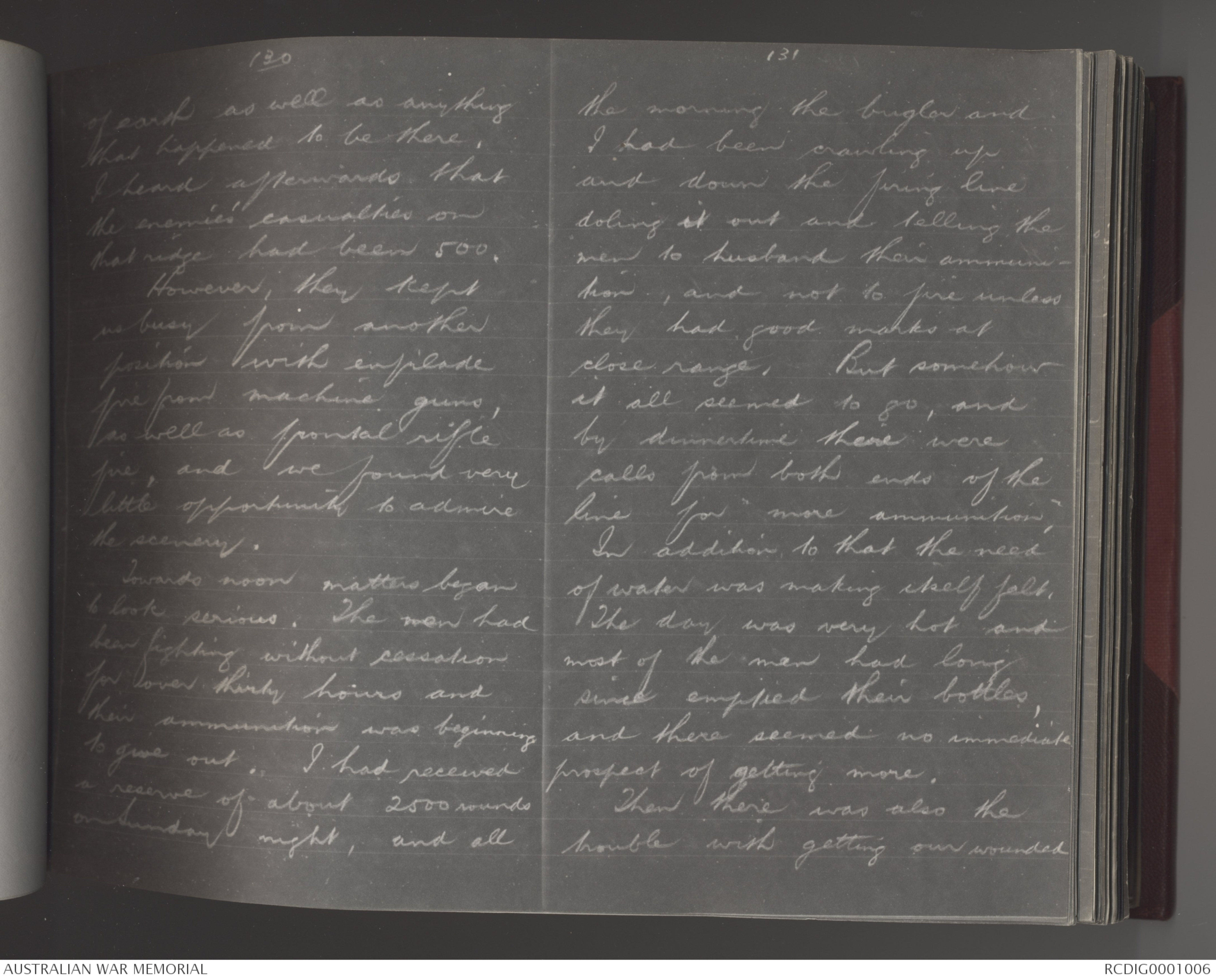
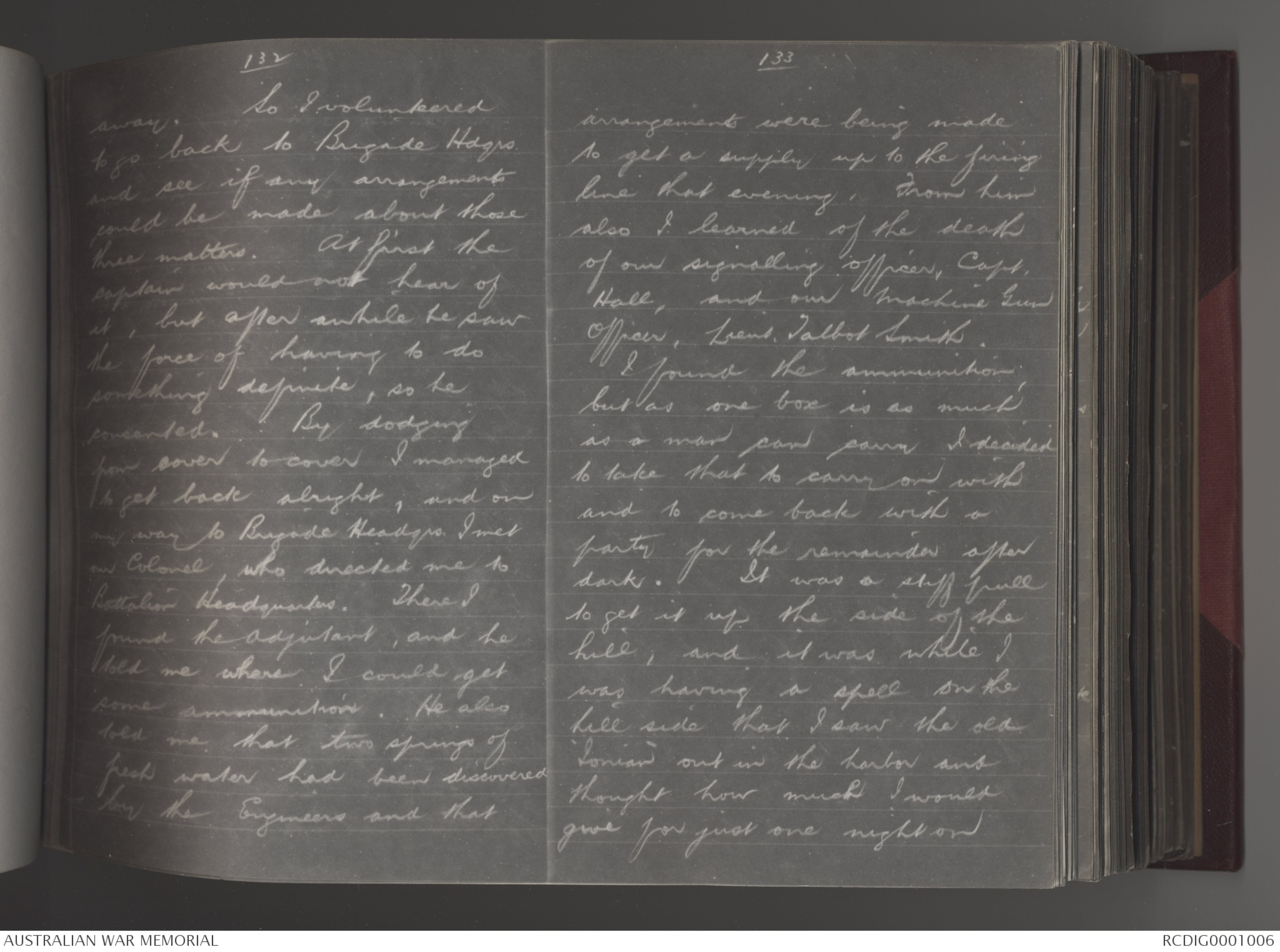
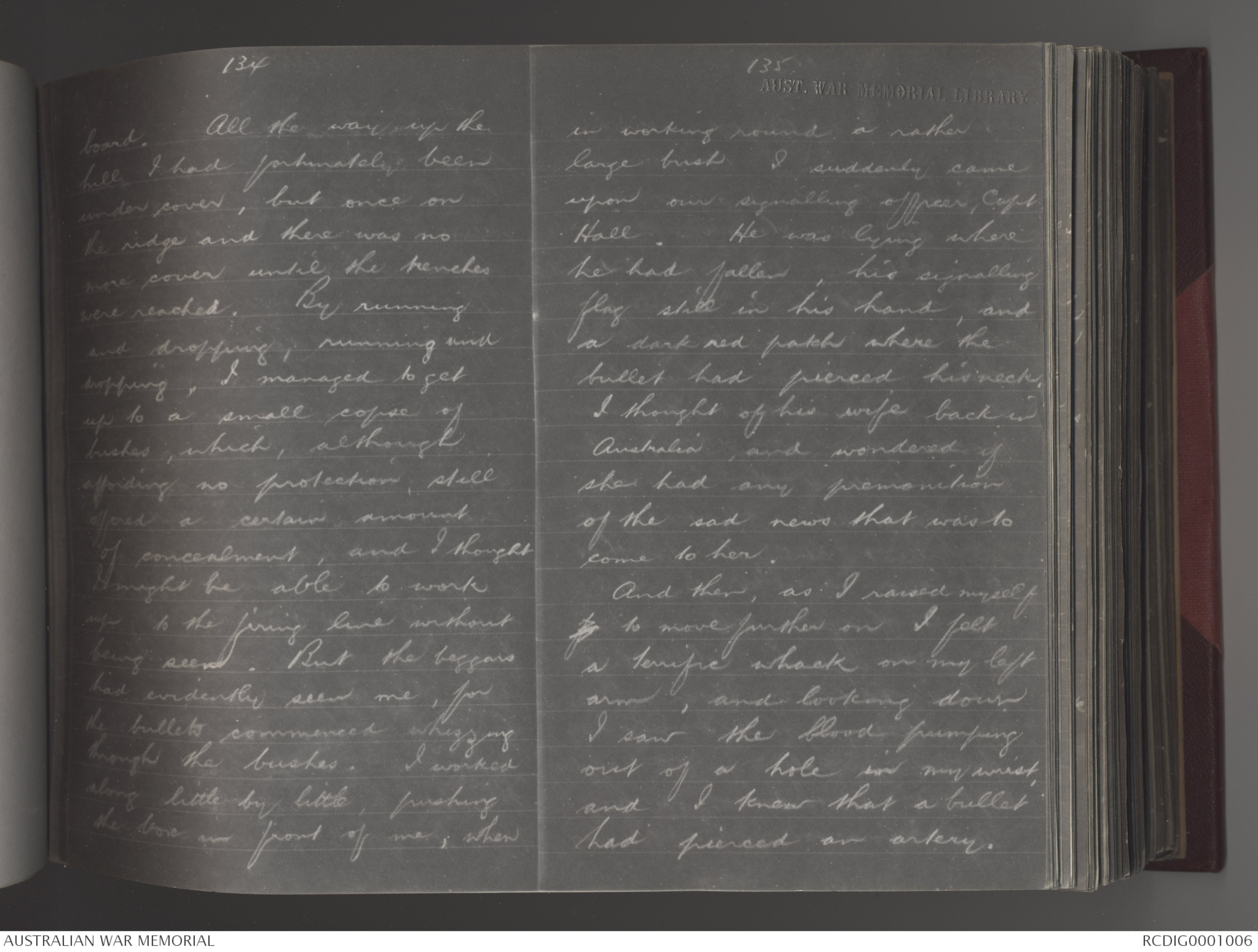
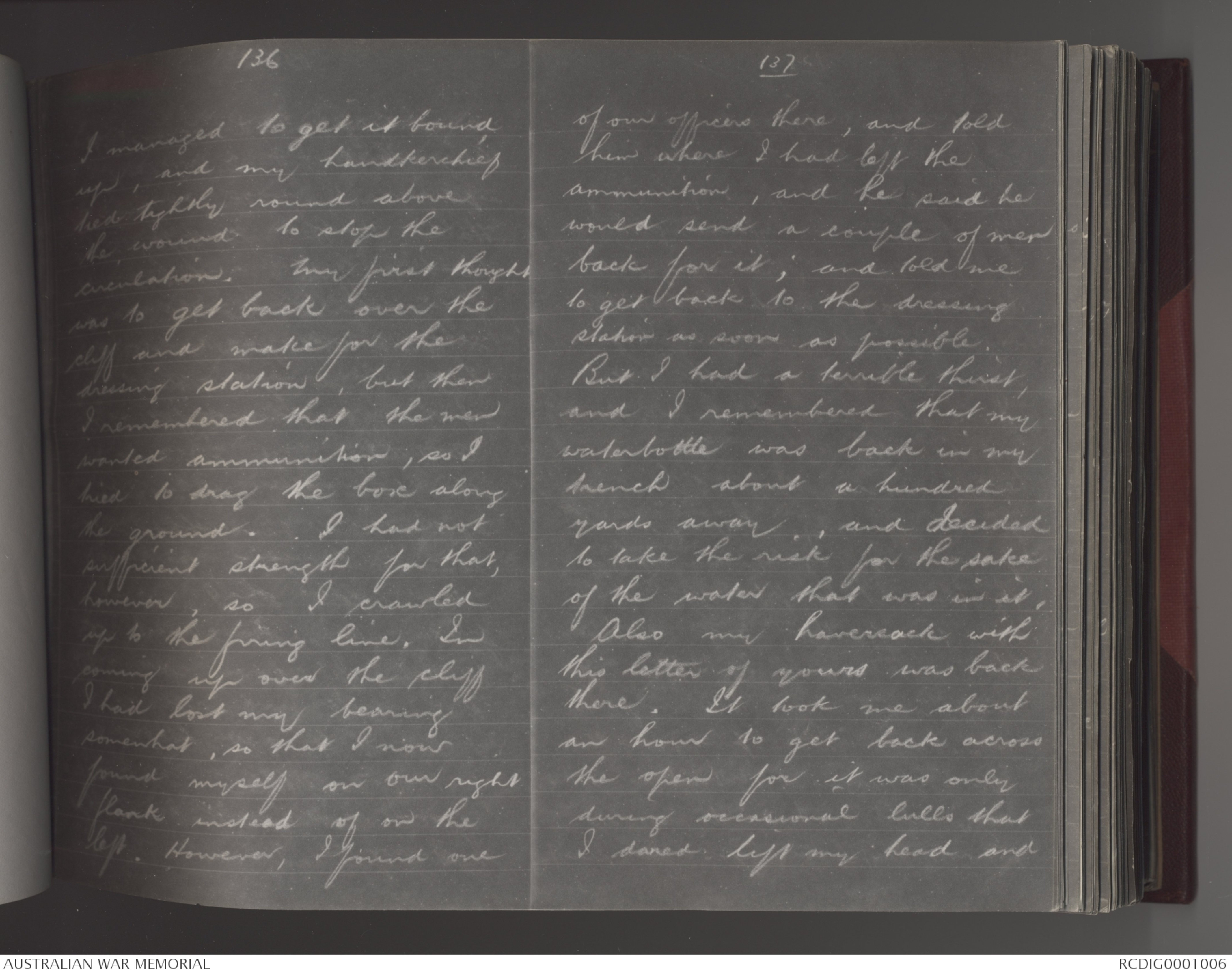
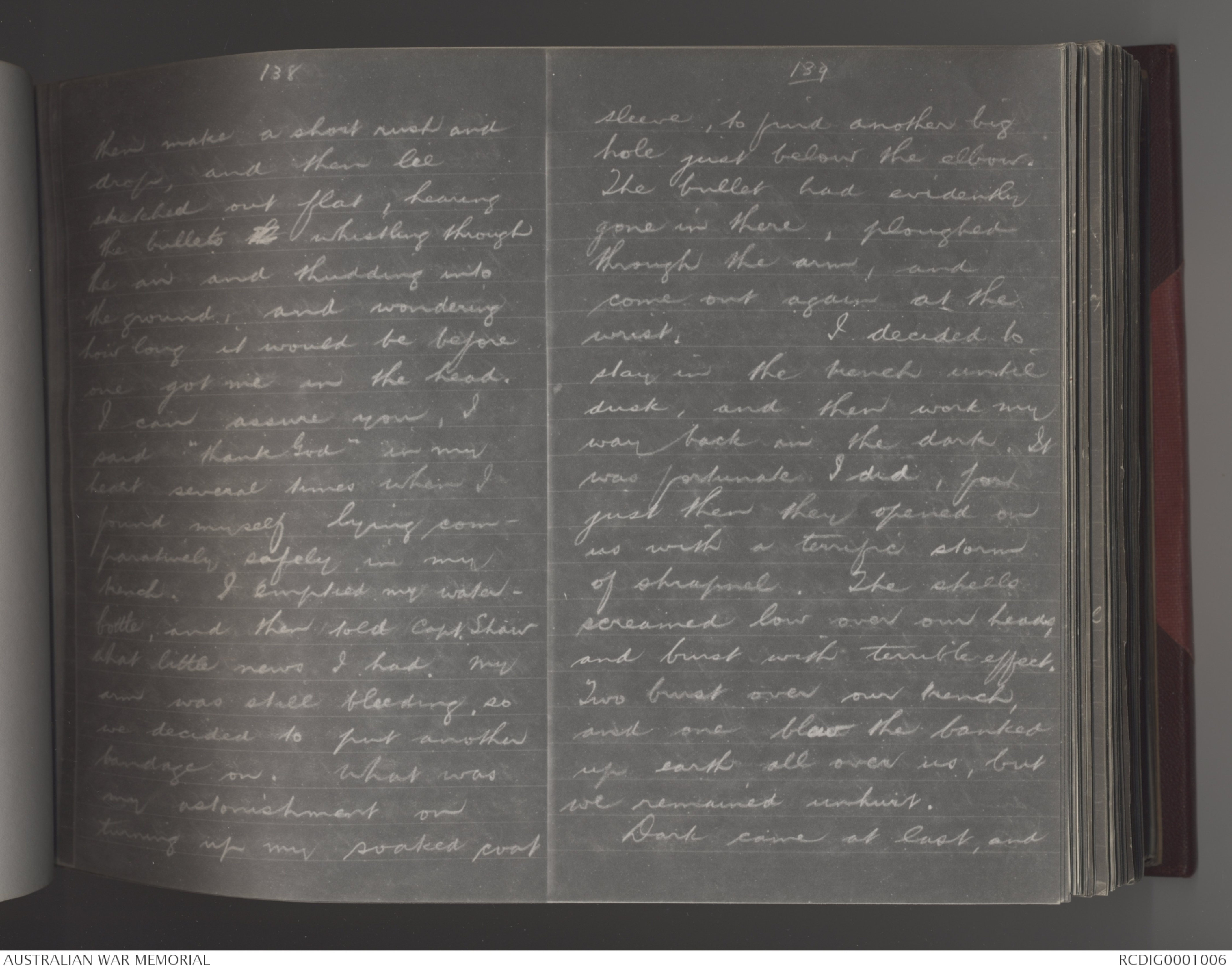
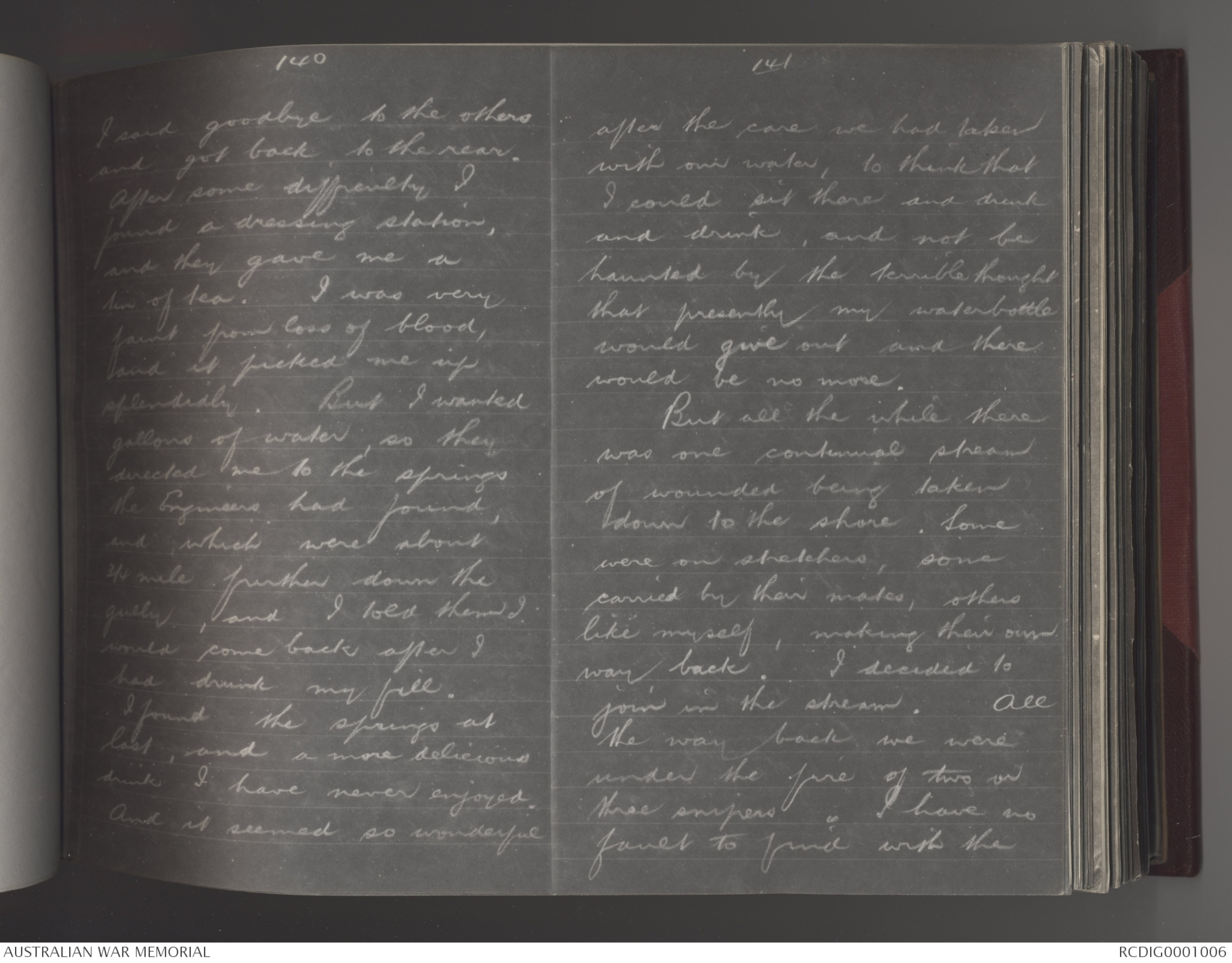
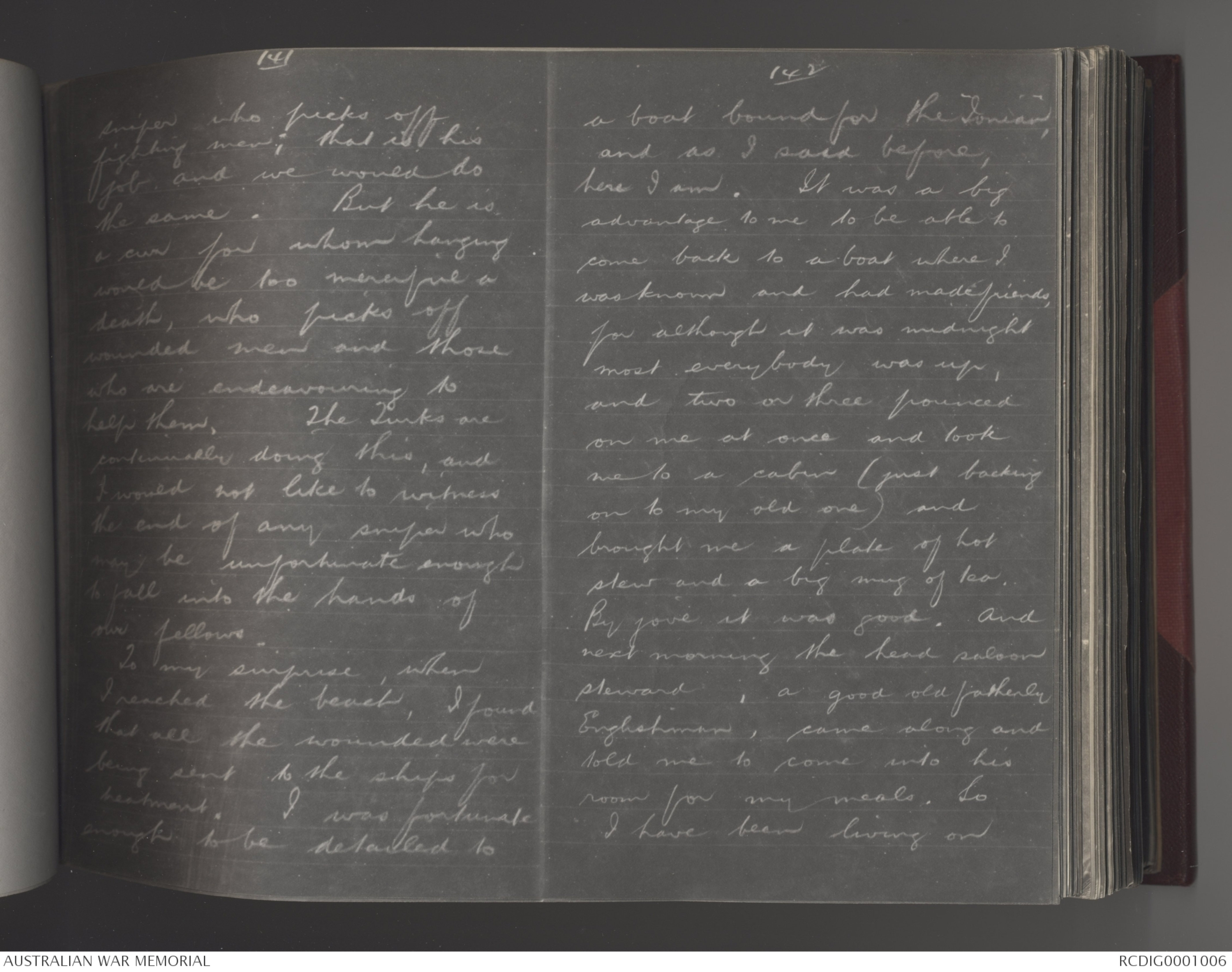
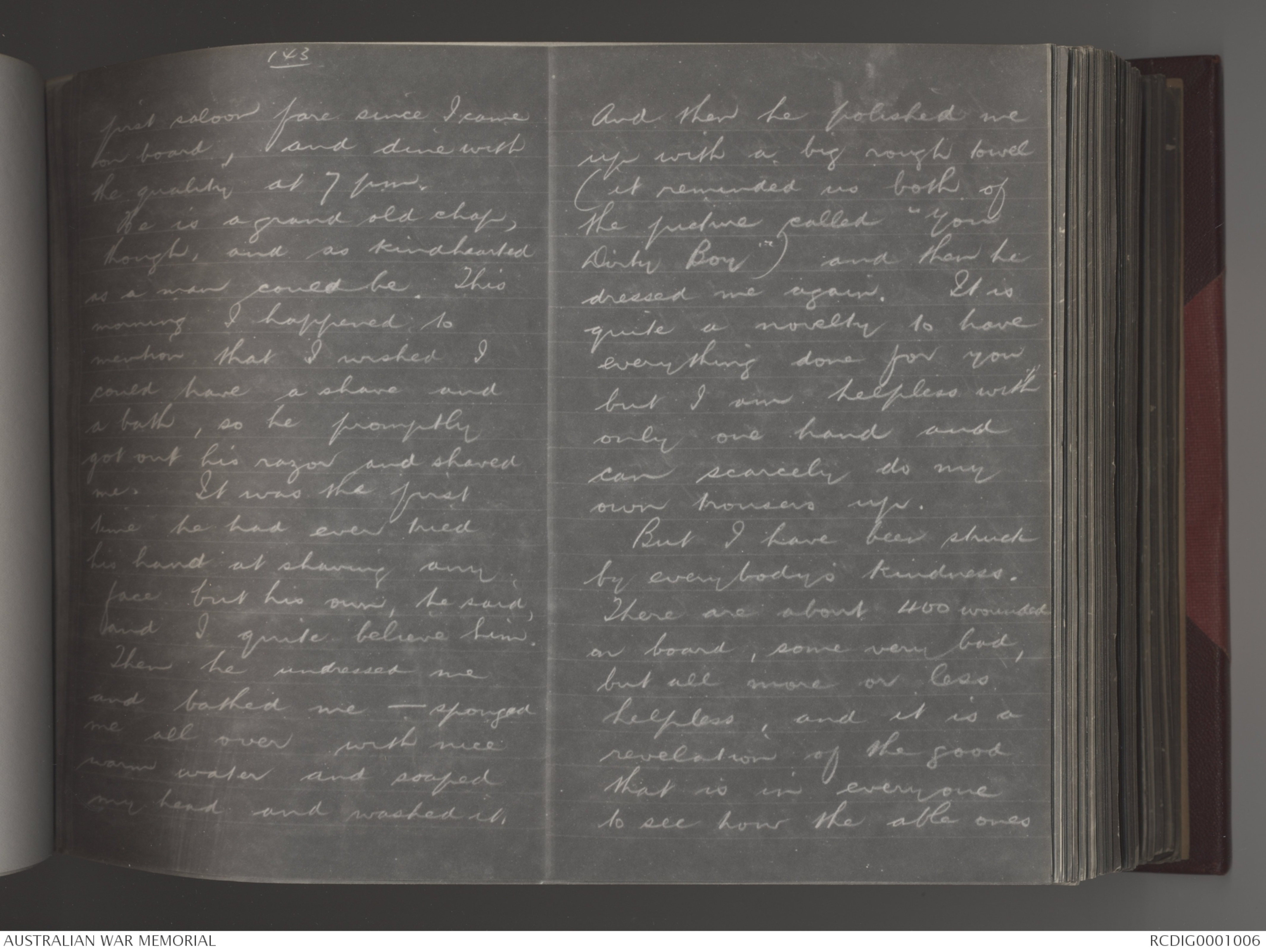
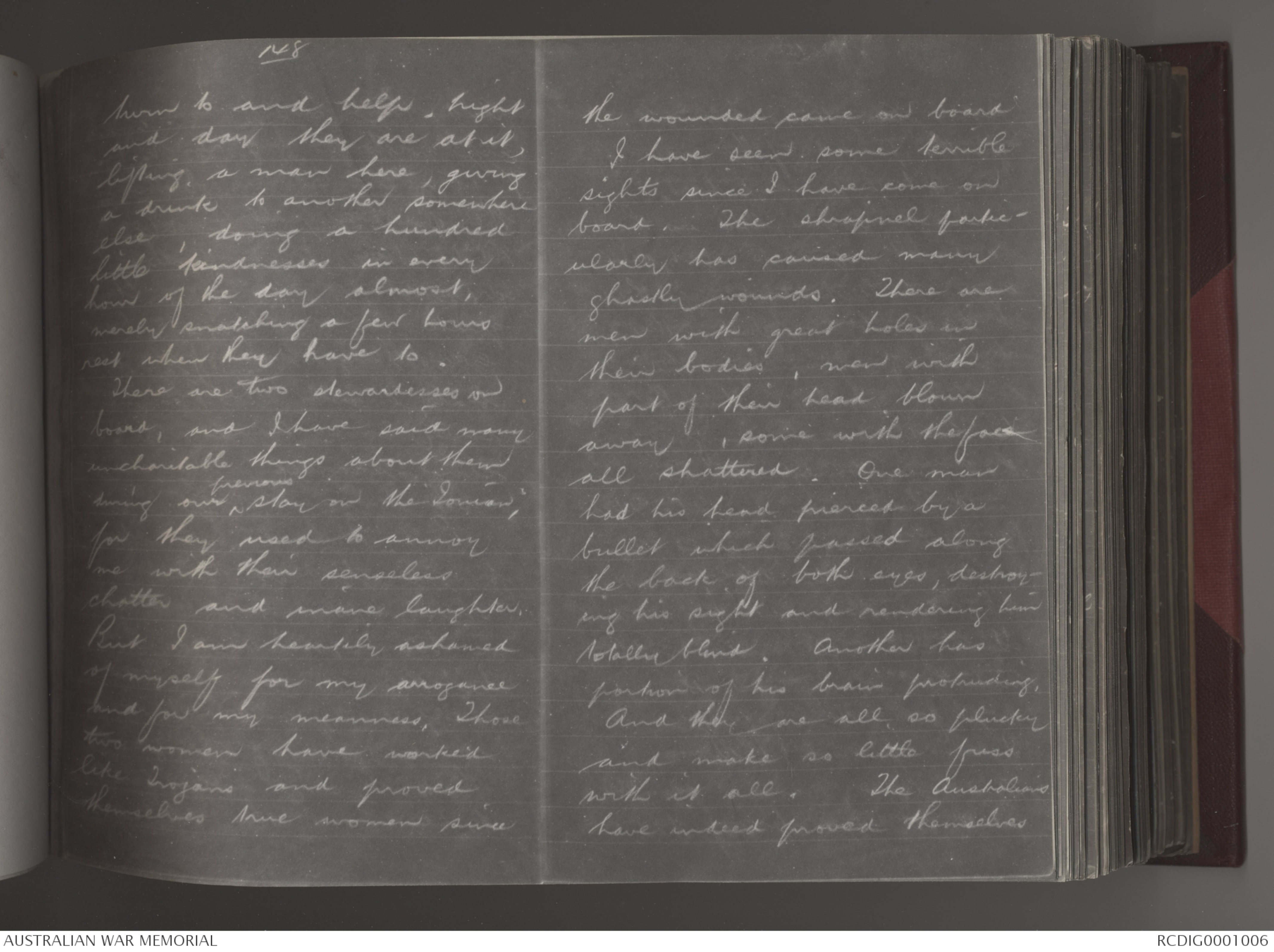
128
other cases were equally bad,
some of the more seriously
wounded dying before
assistance could be obtained.
It is nerve racking I can tell
you, to see men being
struck down all round you,
and to hear their cries and
not be able to help them.
A man with whom I was
working, in passing orders to
and fro along the firing line
suddenly ducked his head
as a burst of firing was heard.
After it had passed I repeated
the message I had
been in the set of giving him,
but he took no notice. I
called on him several times
without any response, so I
crawled up to his position. The
129
poor fellow had been shot
through the head, and was
quite dead. At first
these things fill you with
horror, but after awhile you
become accustomed to them and
take little notice.
On Monday we had
another busy day. During
the morning there was no
shrapnel, as the big guns
from the warships were
sending great shells weighing
about a ton, hurtling over
the hills and cutting great
slices off the crest of the hill
on which were the enemy's guns.
The shooting was wonderful.
Shell after shell would
burst exactly on the ridge,
carrying away great masses
130
of earth as well as anything
that happened to be there,
I heard afterwards that
the enemie's casualties on
that ridge had been 500.
However, they kept
us busy from another
position with explode
fire from machine guns,
as well as frontal rifle
fire, we found very
little opportunity to admire
the scenery.
Towards noon matters began
to look serious. The men had
been fighting without cessation
for over thirty hours and
their ammunition was beginning
to give out. I had received
a reserve of about 2000 rounds
on Sunday night, and all
131
the morning the bugler and
I had been crawling up
and down the firing line
doling out and telling the
men to husband their ammunition,
and not to fire unless
they had good marks at
close range. But somehow
it all seemed to go, and
by dinnertime there were
calls from both ends of the
line for "more ammunition."
In addition to that the need
of water was making itself felt.
The day was very hot and
most of the men had long
since emptied their bottles,
and there seemed no immediate
prospect of getting more.
Then there was also the
trouble with getting our wounded
132
away. So I volunteered
to go back to Brigade Hdqrs
and see if any arrangements
could be made about those
three matters. At first the
captain would not hear of
it, but after while he saw
the force of having to do
something definite, so he
consented. By dodging
from cover to cover I managed
to get back alright, and on
my way to Brigade Headqrs I met
our Colone,l who directed me to
Battalion Headquarters. There I
found the adjutant, and he
told me where I could get
some ammunition. He also
told me that two springs of
fresh water has been discovered
by the Engineers and that
133
arrangements were being made
to get a supply up to the firing
line that evening. From him
also I learned of the death
of our signalling officer, Capt.
Hall, and our Machine Gun
Officer, Lieut. Talbot Smith.
I found the ammunition
but as one box is as much
as a man can carry on with
and to come back with a
party for the remainder after
dark. It was a stiff pull
to get it up the side of the
hill, and it was while I
was having a spell on the
hill side that I saw the old
"Ionian" out in the harbor and
thought how much I would
give for just one night on
134
board. All the way up the
hill I had fortunately been
under cover, but once on
the ridge and there was no
more cover until the trenches
were reached. By running
and dropping, running and
dropping, I managed to get
up to a small copse of
bushes, which, although
affording no protection, still
offered a certain amount
of concealment, and I thought
I might be able to work
up to the firing line without
being seen. But the beggars
had evidently seen me, for
the bullets commenced whizzing
through the bushes. I worked
along little by little, pushing
the box in front of me, when
135
in working round a rather
large bush I suddenly came
upon our signalling officer, Capt.
Hall. He was lying where
he had fallen, his signalling
flag still in his hand, and
a dark red patch where the
bullet had pierced his neck.
I thought of his wife back in
Australia, and wondered if
she had any premonition
of the sad news that was to
come to her.
And then, as I raised myself
fu to move further on I felt
a terrific whack on my left
arm, and looking down
I saw the blood pumping
out of a hole in my wrist,
and I knew that a bullet
had pierced an artery.
136
I managed to get it bound
up, and my handkerchief
tied tightly round above
the wound to stop the
circulation. My first thought
was to get back over the
cliff and make for the
dressing station, but then
I remembered that the men
wanted ammunition, so I
tried to drag the box along
the ground. I had not
sufficient strength for that,
however, so I crawled
up to the firing line. In
coming up over the cliff
I had lost my bearing
somewhat, so that I now
found myself on our right
flank instead of on the
left. However, I found one
137
of our officers there, and told
him where I had left the
ammunition, and he said he
would send a couple of men
back for it; and told me
to get back to the dressing
station as soon as possible.
But I had a terrible thirst,
and I remembered that my
waterbottle was back in my
trench about a hundred
yards away, and decided
to take the risk for the sake
of the water that was in it.
Also my haversack with
this letter of yours was back
there. It took me about
an hour to get back across
the open for it was only
during occasional lulls that
I dared lift my head and
138
then make a short rush and
drop, and then let
stretched out flat, hearing
the bullets xx whistling through
the air and thudding into
the ground, and wondering
how long it would be before
one got me in the head.
I can assure you, I
said "thank God" in my
head several times when I
found myself lying comparatively
safely in my
trench. I emptied my waterbottle,
and then told Capt. Shaw
what little news I had. My
arm was still bleeding so
we decided to put another
bandage on. What was
my astonishment on
turning up my soaked coat
139
sleeve, to find another big
hole just below the elbow.
The bullet had evidently
gone in there, ploughed
through the arm, and
come out again at the
wrist. I decided to
stay in the trench until
dusk, and then work my
way back in the dark. It
was fortunate I did, for
just then they opened on
us with a terrific storm
of shrapnel. The shells
screamed low over our heads,
and burst with terrible effect.
Two burst over our trench,
and one blew the banked
up earth all over us, but
we remained unhurt.
Dark came at last, and
140
I said goodbye to the others
and got back to the rear.
After some difficulty I
found a dressing station,
and they gave me a
tin of tea. I was very
faint from loss of blood,
and it picked me up
splendidly. But I wanted
gallons of water, so they
directed me to the springs
the Engineers had found,
and which were about
3/4 mile further down the
gully, and I told them I
would come back after I
had drunk my fill.
I found the springs at
last, and a more delicious
drink I have never enjoyed.
And it seemed so wonderful
141
after the care we had taken
with our water, to think that
I could sit there and drink
and drink, and not be
haunted by the terrible thought
that presently my waterbottle
would give out and there
would be no more.
But all the while there
was one continual stream
of wounded being taken
down to the shore. Some
were on stretchers, some
carried their mates, others
like myself, making their own
way back. I decided to
join in the stream. All
the way back we were
under the fire of two or
three snipers . I have no
fault to find with the
141
sniper who picks off
fighting men; that is his
job and would do
the same. But he is
a cur for whom hanging
would be too merciful a
death, who picks off
wounded men and those
who are endeavouring to
help them. The Turks are
continually doing this, and
I would not like to witness
the end of any sniper who
may be unfortunate enough
to fall into the hands of
our fellows.
To my surprise, when
I reached the beach, I found
that all the wounded were
being sent to the ships for
treatment. I was fortunate
enough to be detailed to
142
a boat bound for the "Ionian",
and as I said before,
here I am. It was a big
advantage to me to be able to
come back to a boat where I
was known and had made friends,
for although it was midnight
most everybody was up,
and two or three pounced
on me at once and took
me to a cabin (just backing
on to my old one) and
brought me a plate of hot
stew and a big mug of tea.
By jove it was good. And
next morning the head saloon
steward, a good old fatherly
Englishman, came along and
told me to come into his
room for my meals. So
I have been living on
143
first saloon fare since I come
on board, and dine with
the quality at 7 p.m.
He is a grand old chap,
though, and as kindhearted
as a man could be. This
evening I happened to
mention that I wished I
could have a shave and
a bath, so he promptly
got out his razor and shaved
me. It was the first
time he had ever tried
his hand at shaving any
face but his own, he said,
and I quite believe him.
Then he undressed me
and bathed me - sponged
me all over with nice
warm water and soaped
my head and washed it.
And then he polished me
up with a big rough towel
(it reminded us both of
the picture called "You
Dirty Boy") and then he
dressed me again. It is
quite a novelty to have
everything done for you
but I am helpless with
only one hand and
can scarcely do my
own trousers up.
But I have been struck
by everybody's kindness.
There are about 400 wounded
on board, some very bad,
but all more or less
helpless, and it is a
revelation of the good
that is in everyone
to see how the able ones
148
turn to and help. Night
and day they are at it,
lifting a man here, giving
a drink to another somewhere
else, doing a hundred
little kindnesses in every
hour of the day almost,
merely snatching a few hours
rest when they have to.
There are two stewardesses on
board, and I have said many
uncharitable things about them
during our ∧ previous stay on the "Ionian",
for they used to annoy
me with their senseless
chatter and inane laughter.
But I am heartily ashamed
of myself for my arrogance
and for my meanness. Those
two women have worked
like Trojans and proved
themselves true women since
the wounded came on board.
I have seen some terrible
sights since I have come on
board. The shrapnel particularly
has caused many
ghastly wounds. There are
men with great holes in
their bodies, men with
part of the head blown
away, some with the face
all shattered. One man
had his head pierced by a
bullet which passed along
the back of both eyes, destroying
his sight and rendering him
totally blind. Another has
portion of his brain protruding.
And they are all, so plucky
and make so little fuss
with it all. The Australians
have indeed proved themselves
 Loretta Corbett
Loretta CorbettThis transcription item is now locked to you for editing. To release the lock either Save your changes or Cancel.
This lock will be automatically released after 60 minutes of inactivity.